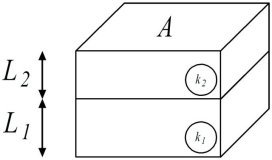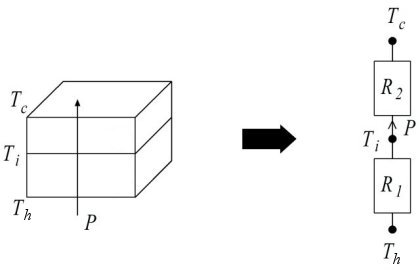www.leguman.ht.st
| HEAD LOSSES |
PUMPS |
CONDUCTION |
©
2001 - 2002.
|
| previous | ||
|
Still a little further... Now let us consider 2 plates one being above the other, always presumably insulated on the sides, with conductivity k1 and k2 , thickness L1 and L2 but with the same surface area :
For each plate, we independently have :
Ti
being the temperature of the interface between
the two plates and R1
, R2
thermal resistances of each plates.
We then obtain a relation which is valid for the two plates and write
It works like in electricity for resistors in series, resistances are added !
|
||
| previous |

